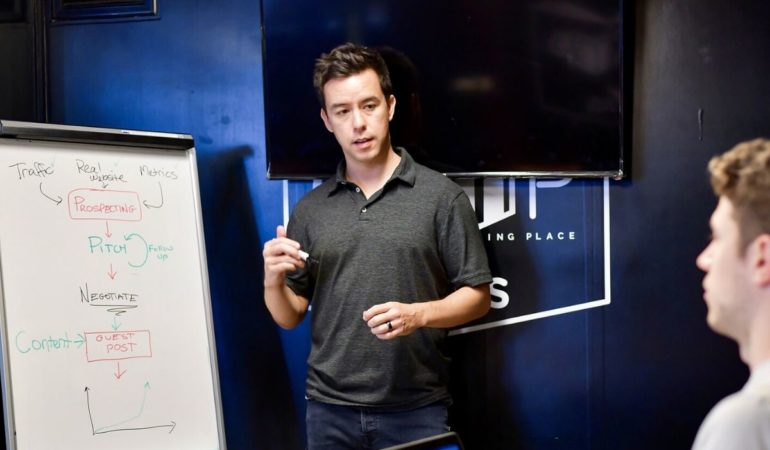Positive Student-Teacher Relationships and Overall Well-Being (VIDEO)

Supportive Educator-Student Relationships
As a part of a Well-Being BC initiative, iLearn shared how our unique Educator-Student Relationships lead to positive outcomes when it comes to mental health.
It’s our commitment to produce upstanding community members over academics. Grades are important for university admissions and some special programs – we understand that. But not at all costs.
Principal Naz is guided by the popularized Aristotle quote where she states her goal “has always been around educating not only the mind, but also the heart”.
Mental health and students’ overall well-being is crucial for learning and retaining information. If we fail to prioritize one’s well-being, then we are failing as educators. In fact, Well-Being BC’s website states “Research suggests that children who experience a greater sense of well-being are more able to learn and assimilate information in effective ways; more likely to engage in healthy and fulfilling social behaviours; more likely to invest in their own and others’ well-being and in the sustainability of the planet, as they take up their social, professional and leadership roles in adulthood.” [1]
Challenging Social Norms
Mental health issues are sparingly brought up at the dinner table. Despite our society’s shift to being more health-conscious, this is a major problem we cannot ignore. One’s mental and emotional well-being is important for academic success. When a student is stressed, the last thing you need is a teacher or staff member placing more stress on them.
Vice-Principal Lymburner takes a different approach when students are causing a disruption, or when students are struggling. “If there was ever a disciplinary action that needed to happen, it’s never going to be yelling or reprimanding in a negative type way, it’s always going to be going deeper and trying to find out what the actual issue is.”
iLearn’s ethos is built on encouraging personal growth – whatever that may be. Other school environments can feel cold and unwelcome and it can be difficult to build strong relationships. At iLearn we take the opposite approach. We find this helps build an overall positive school climate.
Well-Being BC Video – Supportive Educator-Student Relationships
Well-Being BC is pushing for cultural changes for schools to support a holistic learning approach. The website goes on to state “There is a significant relationship between spiritual, mental and emotional well-being and mental health. We also know that effective prevention and early intervention can help to significantly reduce the prevalence of mental health issues. When children learn about healthy attitudes, thinking and behaviours at a young age, they are better equipped to deal with challenges that they may experience later in life. At the same time, as a society, we need to ensure that people have access to resources and support at every stage of life, including during the school years.”[2]
A culture of openness
The staff at iLearn takes little steps to help students build lasting relationships and the teachers at iLearn are no exception. Ms. Eenkhoorn, teacher at iLearn, tries to make every student feel as welcome as possible.
“I try to make sure my students always know my door is always open to them. I can talk to them about whatever they want to talk about.” Ms. Eenkhoorn even goes on to say, “I try to make sure that I greet them every morning when they come in and they walk by my office; I always have a smile for them; I always say hello. Now they stop by my office to say hello to me on their way in.”
This is especially true for students in the Blended Learning program where coming to campus is mandatory twice each week.
Consequently, students that do not foster strong connections in high school may feel more isolated. Far too often students are cut off from many of the relationships built in high school after graduating and Vice-Principal Lymburner demonstrates how iLearn can break the norms and “cultivate open communication and deeper relationships.”
This allows students to truly feel welcome in their learning environment, which contributes to better academic performance.
Authentic, radical love
The teachers at iLearn are encouraged to build these connections because later in life, a strong educator-student relationship will leave a lasting impression. Principal Naz’s philosophy is focused on authenticity and kindness. “It’s about being really authentic, really real, but radically loving them at the same time.”
Mr. Tan, another teacher at iLearn, goes on to speak on the level of humanity that is required to build positive relationships.
“Just the student teacher relationship alone, requires a little bit of humanity. You need to humanize the relationship – not just an authoritative relationship. We’re connecting and you can get a sense of the student through what they say, their work habits, if you catch trends – things like that. And you have to kind of read between the lines.”
Well-Being BC is a mental health initiative centred around social emotional learning, mental health literacy, and trauma-informed approaches in schools. Their resources include Instructional Videos, Video Viewing Guides, Infographics, and an Assessment & Growth Plan Toolkit. Check out their website by visiting wellbeingbc.ca.
If you think you or your child could benefit from a more holistic approach to graduating high school, then contact us to see how we can help or apply now to enroll today.
[1] Awartani, M., Whitman, C. V. and Gordon, J. (2008). Developing Instruments to Capture Young People’s Perceptions of how School as a Learning Environment Affects their Well‐Being. European Journal of Education, 43: 51-70.
[2] 2. Center on the Developing Child (2013). Early Childhood Mental Health (InBrief). Retrieved from www.developingchild.harvard.edu.

